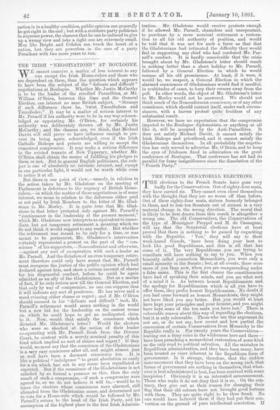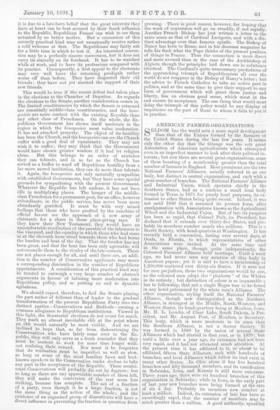THE FRENCH SENATORIAL ELECTIONS. T HE elections to the French Senate
have gone very badly for the Conservatives. Out of eighty-four seats, they have carried six. They cannot even cheer themselves with the thought that they are no worse off than before. Out of these eighty-four seats, sixteen formerly belonged to them, and to lose ton Senators out of sixteen is a very material change in the wrong direction. The moral that is likely to be first drawn from this result is altogether a wrong one. The old Conservatives, the Conservatives of the type of Monsignor Freppel and M. de Cassagnac, will say that the Senatorial elections have at least proved that there is nothing to be gained by coquetting with the Republic. You,' they will say to their weak-kneed friends, have been doing your best to look like good Republicans, and this is all that has come of it. The very Republicans you are trying to conciliate will have nothing to say to you. When you honestly called yourselves Monarchists, you were only a small minority in the Senate ; but, at all events, there were more of you than now, when you are masquerading under a false name. This is the first chance the constituencies have had of speaking their minds, and you see what sort of a mind it is. As between honest Republicanism and the apology for Republicanism which is all you have to offer them, •they prefer honest Republicanism. No doubt if you had come forward as honest Monarchists, they might not have liked you any better. But you would at least have kept your principles and your honour, and you might have kept some of the ten seats you have lost.' There is colourable reason about this way of regarding the elections, but it is only colourable. Those who use this argument do not see, or do not say, how recent and how partial the conversion of certain Conservatives from Monarchy to the Republic really is. For twenty years the Conservatives— leaving out a stray voice in the wilderness here and there— have been preaching a monarchical restoration of some kind as the only road to political salvation. All the mistakes in Republican administration, and they have been many, have been treated as vices inherent in the Republican form of government. Is it strange, therefore, that the sudden announcement that they have been on the wrong tack, that forms of government are nothing in themselves, that what- ever is best administered is best, has been received with some tsuspieion ? Obviously it is an interested announcement. Those who make it do not deny that it is so. On the con- trary, they give out as their reason for changing their flag that their old colours have not brought good fortune with them. They are quite right to be thus frank. No one would have believed them if they had put their con- version on the ground of pure intellectual conviction. If it is due to a late-born belief' that the great interests they have at heart can be best secured by their frank adhesion to the Republic, Republican France can wish to see them actuated by no better motive. But a conversion of this severely practical kind may not unnaturally receive rather a cold welcome at first. The Republicans may fairly ask for a little time in which to test it. An interested conver- sion may be a perfectly sincere conversion, but it does not carry its sincerity on its forehead. It has to be watched while at work, and to have its professions compared with its practice. Consequently, a first appeal to the electorate may very well leave the returning prodigals rather worse off than before. They have disgusted their old friends ; they have not yet merited the support of their new friends.
This would be true if the recent defeat had taken place in the elections to the Chamber of Deputies. As regards the elections to the Senate, another consideration comes in. The limited constituencies by which the Senate is returned are essentially middle-class constituencies, and the bour- geoisie are more content with the existing Republic than any other class of Frenchmen. On the whole, the Re- publican Government has shown itself moderate in the region in which the bourgeoisie most value moderation. It has not attacked property. The object of its hostility has been the Church, and the bourgeoisie can see the Church suffer with a good deal of equanimity. They may not wish it to suffer ; they may think that the Government would have shown greater -wisdom if it had let religion alone. But this belongs to an order of mistakes they can tolerate, and in so far as the Church has served as a buffer to ward off Republican hostility from a far more sacred institution, they can do more than tolerate it. Again, the bourgeoisie not only naturally sympathise with established Governments, but 'they have some special grounds for sympathising with the present Government. Whatever the Republic has left undone, it has not been idle in multiplying places. The hunger of the middle- class Frenchman for a permanent post, for an office, however subordinate, in the public service, has never been more abundantly gratified. It must be with very mixed feelings that those who have profited by the sunshine of official favour see the approach of a new army of claimants for a share in these place-giving rays. If they knew their New Testament, they would have an uncomfortable recollection of the parable of the labourers in the vineyard, and the equality in which those who had come in at the eleventh hour stood towards those who had borne the burden and heat of the day. That the burden has not been great, and that the heat has been only agreeable, will not reconcile them to the rivalry of the late-comers. There are not places enough for all, and until there are, an addi- tion to the number of Conservative applicants may mean a corresponding diminution in the number of Republican appointments. A consideration of this practical kind may be trusted to outweigh a very large number of abstract arguments in favour of infusing more moderation into Republican policy, and so putting an end to dynastic agitations.
We should expect, therefore, to find the Senate playing the part rather of follower than of leader in the gradual transformation of the present Republican Party into two distinct parties—Conservatives and Radicals—owning a common allegiance to Republican institutions. Viewed in this light, the Senatorial elections do not count for much. They mark an almost inevitable ebb at the point where an ebb would. naturally be most visible. And we are inclined to hope that, so far from disheartening the Conservatives who have lately come over to the Re- public, they will only serve as a fresh reminder that they must be content to work for some time longer with- out realising their reward. Nor must it be forgotten that its realisation must be imperfect as well as slow, so long as some of the most familiar faces and best- known speakers in the Conservative ranks decline to take any part in the acceptance of the Republic. These recalci- trant Conservatives will probably die out by degrees ; but so long as there are any appreciable number of them left, they will make the conversion of the rest seem less striking, because less complete. The act of a fraction of a party, even though it be a large fraction, is not the same thing as the action of the whole ; and the existence of an organised group of dissentients will have a direct influence in preventing the fraction in question from growing. There is good reason, however, for hoping that the work of conversion will go on steadily, if not rapidly, Another French Bishop hasjust written a letter in the same sense as that of Cardinal Lavigerie, and with a dis- tinct advantage over that famous epistle. The Bishop of Nancy has been to Rome, and in his diocesan magazine he tells his flock what the Pope thinks of the present position of things in France. Thus the connection is more direct and more avowed than in the case of the Archbishop of Algiers, though the principles laid down are in substance identical. The Cardinal's quite unnecessary predictions of the approaching triumph of Republicanism all over the world do not reappear in the Bishop of Nancy's letter ; but the advice to French Catholics to take an active part in politics, and at the same time to give their support to any form of government which will grant them justice and liberty, has an obvious good sense, which must in the end ensure its acceptance. The one thing that would most delay the triumph of this policy would be any display of impatience on the part of those to whom it falls to put it in practice.

































 Previous page
Previous page